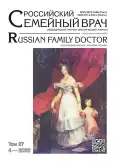Creation of a model for training the communication skills of medical specialists
- Authors: Shubina L.B.1, Lopatin Z.V.2
-
Affiliations:
- M.V. Lomonosov Moscow State University
- Russian Medical Academy of Continuing Professional Education
- Issue: Vol 27, No 4 (2023)
- Pages: 41-50
- Section: Medical Education
- URL: https://journal-vniispk.ru/RFD/article/view/249846
- DOI: https://doi.org/10.17816/RFD607409
- ID: 249846
Cite item
Abstract
BACKGROUND: Effective interaction between medical workers and patients is not only a service function but also influences compliance with the implementation of recommendations for the prevention and treatment of diseases. The communicative competence of healthcare professionals affects treatment effectiveness and the success of health-preserving measures.
AIM: To examine the problems associated with the formation of communicative competence and determine the fundamental principles of the model of communicative skills of a medical worker.
MATERIALS AND METHODS: A literature review of 32 domestic and 54 foreign publications on teaching communication in medicine was performed. The work of an expert focus group within the framework of a strategic session on communication skills “A coordinated approach to teaching communication skills in medicine” was analyzed.
RESULTS: During the work of the focus group, experts reviewed and specified the main shortcomings in the work of medical personnel in ensuring communication with the patient. In the second part of the focus group work, based on communication defects, four blocks of skills were developed to avoid communication errors. Because of a review of literature data and a generalization of the results of the work of experts, a prototype model of the communication skills of a medical worker was proposed.
CONCLUSIONS: Existing models of medical communication must adapt to national characteristics based on research and joint discussions. The authors propose using fundamental principles of the model of communication skills of a medical worker in educational programs of higher and additional professional education, as outlined in this article.
Full Text
##article.viewOnOriginalSite##About the authors
Lyubov B. Shubina
M.V. Lomonosov Moscow State University
Email: fantomkurs@mail.ru
ORCID iD: 0000-0002-4589-5712
Scopus Author ID: 589610
MD, Cand. Sci. (Med.)
Russian Federation, 1 Leninskie Gory, 119991, MoscowZakhar V. Lopatin
Russian Medical Academy of Continuing Professional Education
Author for correspondence.
Email: zakhar.vadimovich@gmail.com
ORCID iD: 0000-0001-7283-9911
SPIN-code: 6744-5277
Scopus Author ID: 776939
MD, Cand. Sci. (Med.)
Russian Federation, 2/1 building 1 Barrikadnaya St., Moscow, 125993References
- Mueller PS. Incorporating professionalism into medical education: the Mayo clinic experience. Keio J Med. 2009;58:133–143. doi: 10.2302/kjm.58.133
- Rider EA, Keefer CH. Communication skills competencies: definitions and a teaching toolbox. Med Educ. 2006;40:624–629. doi: 10.1111/j.1365-2929.2006.02500.x
- Lingard L, Haber RJ. Teaching and learning communication in medicine: a rhetorical approach. Acad Med. 1999;74:507–510. doi: 10.1097/00001888-199905000-00015
- Haes H. Dilemmas in patient centeredness and shared decision-making: a case for vulnerability. Patient Educ Couns. 2006;62:291–298. doi: 10.1016/j.pec.2006.06.012
- Dunn SM, Butow PN, Tattersall MH, et al. General information tapes inhibit recall of the cancer consultation. J Clin Oncol. 1993;11:2279–2285. doi: 10.1200/JCO.1993.11.11.2279
- Lobb EA, Halkett GK, Nowak AK. Patient and caregiver perceptions of communication of prognosis in high-grade glioma. J Neurooncol. 2011;104:315–322. doi: 10.1007/s11060-010-0495-z
- Ogneva EYu, Gameeva EV, Ognev YuN. Appeals and complaints of oncological patients in the Moscow region, causes, structure, measures to reduce. Modern problems of healthcare and medical statistics. 2020;(4). (In Russ.) doi: 10.24411/2312-2935-2020-00119
- Ng SL, Kinsella EA, Friesen F, Hodges B. Reclaiming a theoretical orientation to reflection in medical education research: A critical narrative review. Med Educ. 2015;49:461–475. doi: 10.1111/medu.12680
- Mylopoulos M, Regehr G. How student models of expertise and innovation impact the development of adaptive expertise in medicine. Med Educ. 2009;43:127–132. doi: 10.1111/j.1365-2923.2008.03254.x
- Silverman J, Kerts S, Draper J. Skills of communication with patients; Transl. from English A.A. Sonkin. Moscow: GRANAT; 2018. 304 p.
- D’yachenko EV, Vasil’eva EYu, Sizova ZhM. Obshchenie s patsientom: modeli, obuchenie, otsenka. In: Spetsialist meditsinskogo simulyatsionnogo obucheniya. Ed. by M.D. Gorshkov. 2nd ed. Moscow: ROSOMED; 2021. P. 176–212.
- Zolnierek KB, Dimatteo MR. Physician communication and patient adherence to treatment: a meta-analysis. Med Care. 2009;47(8):826–834. doi: 10.1097/MLR.0b013e31819a5acc
- Sonkina AA. Skills for professional communication in medical practice. Healthcare management: news, views, education. Bulletin of VSHOUZ. 2015;(1):101–107. (In Russ.)
- Bandiera G, Kuper A, Mylopoulos M, et al. Back from basics: Integration of science and practice in medical education. Med Educ. 2018;52:78–85. doi: 10.1111/medu.13386
- Vasil’eva EYu, Shubina LB. A consensual approach to teaching communication skills in medical education: barriers to implementation. Medical education and professional development. 2022;13(4):20–30. (In Russ.) doi: 10.33029/2220-8453-2022-13-4-20-30
- Vagan A. Medical students’ perceptions of identity in communication skills training: a qualitative study. Med Educ. 2009;43:254–259. doi: 10.1111/j.1365-2923.2008.03278.x
- Mylopoulos M, Woods N. Preparing medical students for future learning using basic science instruction. Med Educ. 2014;48:667–673. doi: 10.1111/medu.12426
- Argyriadis A, Patelarou E, Paoullis P, et al. Self-assessment of health professionals’ cultural competence: knowledge, skills, and mental health concepts for optimal health care. Int J Environ Res Public Health. 2022;19(18):11282. doi: 10.3390/ijerph191811282
- Borracci RA, Álvarez Gallesio JM, Ciambrone G, et al. What patients consider to be a ‘good’ doctor, and what doctors consider to be a ‘good’ patient. Rev Med Chil. 2020;148(7):930–938. doi: 10.4067/S0034-98872020000700930
- Popov VV, Novikova IA. Communicative competence of clinical ordinators within the framework of medical advice. Med Psihol Ross. 2019;11(6). (In Russ.)
- Sonkina AA, Dyachenko EV. What does the course “communication with patients” teach? Dialogue of experts on the tasks and content of teaching doctors in communication skills. Medical education and professional development. 2020;11(3):118–131. (In Russ.) doi: 10.24411/2220-8453-2020-13010
- Koroleva NG, Lopatin ZV, Vozdvizhenskaya AV, Korolev KYu. Formation of the doctor’s communicative competence using virtual patients. Medical education and professional development. 2022;13(3(47)):8–19. (In Russ.) doi: 10.33029/2220-8453-2022-13-3-8-18
- Koroleva NG, Lopatin ZV, Vozdvizhenskaya AV, Korolev KYu. Experience in conducting communicative trainings using virtual patients. Virtual technologies in medicine. 2022;(3(33)):142–144. (In Russ.) doi: 10.46594/2687-0037_2022_3_1463
Supplementary files







